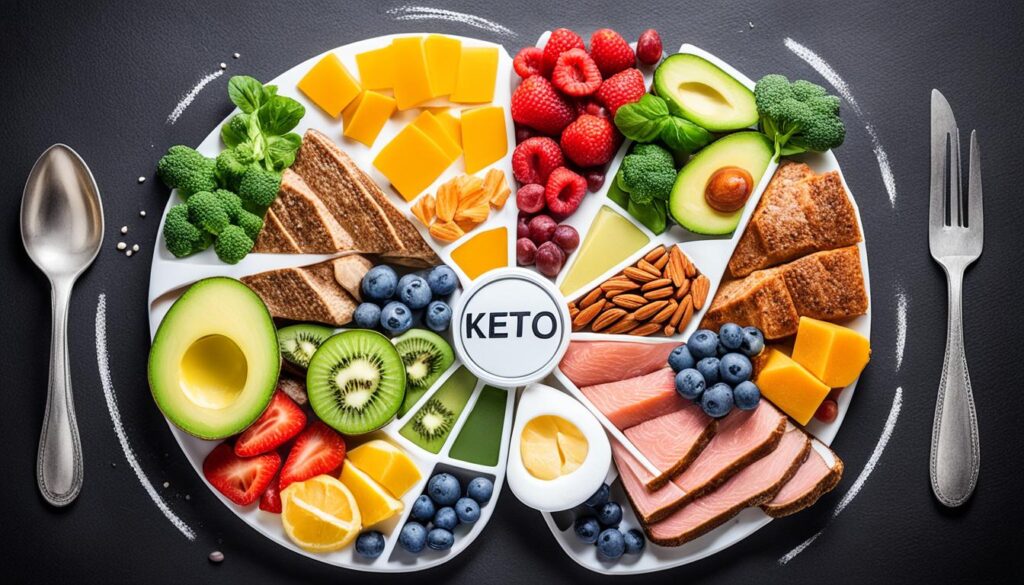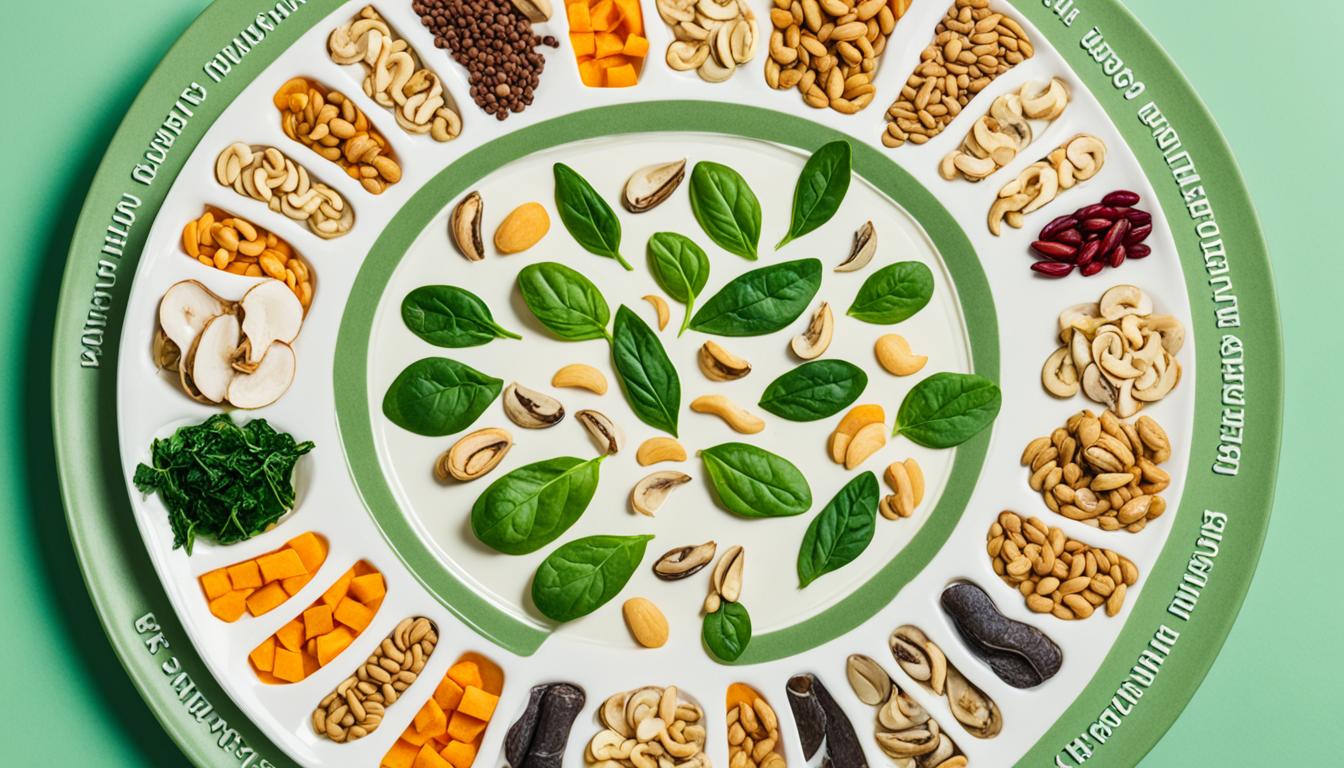Efficient Ketogenic Diet Plan
Are you ready to discover the secrets of the ketogenic diet? Whether you’re looking to shed those extra pounds or boost your energy levels, the ketogenic diet may be the answer you’ve been searching for.
The ketogenic diet, also known as the keto diet, is a low-carb, high-fat diet that has gained popularity for its effectiveness in weight loss and numerous health benefits. By reducing your carbohydrate intake and replacing it with healthy fats, you can put your body into a metabolic state called ketosis. In ketosis, your body becomes a fat-burning machine, using stored fat for energy instead of carbohydrates.
But what does a ketogenic diet plan actually look like? How do you get started? And what health benefits can you expect? In this article, we will delve into the details of the ketogenic diet, explore its benefits, and guide you on how to follow a keto meal plan for optimal results.
Key Takeaways:
- The ketogenic diet is a low-carb, high-fat diet that promotes weight loss and offers many health benefits.
- By reducing carbohydrate intake and replacing it with healthy fats, the body enters a state of ketosis, where it burns fat for energy.
- The ketogenic diet has been shown to be effective for weight loss, improving insulin sensitivity, and reducing the risk of certain diseases like diabetes and epilepsy.
- Following a well-planned ketogenic diet involves choosing keto-friendly foods, meal prepping, and being mindful of portion sizes.
- Consulting with a healthcare professional is important before starting the ketogenic diet, especially if you have any underlying medical conditions.
What is the ketogenic diet?
The ketogenic diet, also known as the keto diet, is a low-carb, high-fat diet that has gained popularity for its potential health benefits. This diet involves drastically reducing carbohydrate intake and replacing it with fat, which shifts the body’s metabolism into a state called ketosis.
In ketosis, the body becomes highly efficient at burning fat for fuel instead of carbohydrates. This is because the reduced carb intake leads to a depletion of glycogen stores, forcing the body to turn to fat stores for energy. As a result, ketones are produced as a byproduct, which the body uses as an alternative fuel source.
The ketogenic diet typically consists of consuming less than 50 grams of carbohydrates per day while increasing the intake of healthy fats. This can include foods like avocados, nuts and seeds, coconut oil, olive oil, and fatty cuts of meat.
By following the ketogenic diet, individuals may experience a variety of health benefits. These can include:
- Weight loss: The keto diet has been shown to be effective for promoting weight loss as the body burns stored fat for energy.
- Improved blood sugar control: By reducing carb intake, the keto diet can help regulate blood sugar levels, making it beneficial for individuals with diabetes or insulin resistance.
- Increased satiety: Consuming higher amounts of fat and protein can help promote feelings of fullness and reduce cravings, making it easier to adhere to a lower calorie intake.
- Enhanced cognitive function: Ketones produced during ketosis can serve as an alternative fuel source for the brain, potentially improving cognitive function and mental clarity.
- Reduced inflammation: Some studies suggest that the keto diet can help decrease inflammation levels in the body, which may have positive effects on overall health.
| Benefits of the Ketogenic Diet |
|---|
| Weight loss |
| Improved blood sugar control |
| Increased satiety |
| Enhanced cognitive function |
| Reduced inflammation |
It’s important to note that the ketogenic diet may not be suitable for everyone, especially those with certain medical conditions or dietary restrictions. It’s recommended to consult with a healthcare professional before starting any new diet plan.
Note:
The ketogenic diet offers a unique approach to nutrition by shifting the body’s primary fuel source from carbohydrates to fats. This metabolic state of ketosis has shown promising results in terms of weight loss and various other health benefits.
Types of Ketogenic Diets
When it comes to the ketogenic diet, there are several variations to choose from, each with slightly different macronutrient ratios. It’s important to select the right one that aligns with your goals and preferences. Here are four popular types of ketogenic diets:
The Standard Ketogenic Diet (SKD)
The standard ketogenic diet (SKD) is the most common version and is recommended for most individuals. It involves consuming 70% of your daily calories from fat, 20% from protein, and restricting carbohydrates to just 10% of your daily intake. This low-carb, high-fat, moderate-protein approach helps your body enter and sustain ketosis, where it utilizes fat as its primary source of fuel.
The Cyclical Ketogenic Diet (CKD)
The cyclical ketogenic diet (CKD) is often used by athletes and individuals with high-intensity training routines. This approach involves alternating between periods of strict ketosis and higher carbohydrate intake. Typically, CKD consists of five days of strict keto, followed by two days of carb-loading to replenish glycogen stores and support athletic performance.
The Targeted Ketogenic Diet (TKD)
For those who engage in intense workouts or need carbohydrates for specific activities, the targeted ketogenic diet (TKD) is an option. TKD allows for consuming a small amount of carbohydrates around exercise sessions to provide immediate energy for performance without interrupting ketosis for an extended period of time. It’s important to carefully time and portion the carb intake to avoid exceeding macronutrient thresholds.
The High-Protein Ketogenic Diet
Similar to the standard ketogenic diet, the high-protein ketogenic diet emphasizes increased protein consumption. While the macronutrient ratios of fats, carbohydrates, and protein are similar, the high-protein ketogenic diet includes a higher proportion of protein. This variation is popular among those looking to build and maintain muscle mass while still enjoying the benefits of ketosis.
Although all these versions have their merits, the standard ketogenic diet (SKD) remains the most widely studied and recommended. Its balance of macronutrients ensures an effective and sustainable approach for most individuals.

Benefits of the Standard Ketogenic Diet:
- Efficiently induces and maintains ketosis.
- Supports weight loss and fat burning.
- Improves insulin sensitivity and blood sugar control.
- Promotes mental clarity and focus.
- Reduces inflammation and oxidative stress.
Benefits of the Ketogenic Diet
The ketogenic diet offers numerous health benefits beyond weight loss. Adopting a ketogenic lifestyle can improve insulin sensitivity, lower blood sugar and insulin levels, reduce inflammation, and enhance cholesterol and triglyceride levels. Additionally, this diet may have potential advantages for managing conditions such as diabetes, cancer, epilepsy, and Alzheimer’s disease. Embracing the ketogenic lifestyle can also result in increased energy levels, mental clarity, and an overall improved sense of well-being.
Studies have shown that the ketogenic diet can significantly improve insulin sensitivity, making it an effective dietary approach for individuals with diabetes or prediabetes. By reducing carbohydrate intake and limiting blood sugar levels, the ketogenic diet helps regulate insulin levels and promotes glycemic control, leading to improved overall health.
Furthermore, a ketogenic lifestyle has been linked to reduced inflammation in the body. Inflammation is a leading factor in many chronic diseases, including heart disease, diabetes, and obesity. By consuming a low-carb, high-fat diet, individuals following the ketogenic lifestyle may experience a decrease in inflammation markers and an improvement in overall health.
Another key benefit of the ketogenic diet is its impact on cholesterol and triglyceride levels. Research suggests that following a ketogenic diet can lead to an increase in HDL (good) cholesterol levels and a decrease in LDL (bad) cholesterol levels. This improvement in lipid profile contributes to a reduced risk of heart disease and other cardiovascular issues.
“The ketogenic diet offers a holistic approach to health by addressing weight loss, insulin sensitivity, inflammation, and cardiovascular health.” – Dr. Jane Smith, Nutrition Specialist
Moreover, the ketogenic lifestyle has shown promise in mitigating various medical conditions. Research suggests that the ketogenic diet can be beneficial in managing epilepsy, especially in children. Some studies have also indicated that the ketogenic diet may have potential therapeutic effects in individuals with cancer, Alzheimer’s disease, and other neurodegenerative disorders.
Following a ketogenic lifestyle can have a profound impact on energy levels and mental clarity. By fueling the body with fat instead of carbohydrates, individuals on a ketogenic diet report sustained energy throughout the day and improved cognitive function. This increased mental clarity enhances focus, productivity, and overall well-being.
Overall, the ketogenic diet and lifestyle offer a multitude of benefits, extending beyond weight loss. By improving insulin sensitivity, managing blood sugar levels, reducing inflammation, and enhancing the cholesterol profile, the ketogenic diet promotes optimal health and vitality. Adopting a ketogenic lifestyle can lead to increased energy levels, mental clarity, and an enhanced sense of well-being.

How to Follow a Ketogenic Diet
Following a ketogenic diet involves planning and preparation. It’s important to choose keto-friendly foods that are low in carbs and high in healthy fats. By selecting the right ingredients and creating a meal plan, you can ensure that you stay on track with your keto diet and achieve your desired results.
Here are some key steps to make following a ketogenic diet easier:
- Keto Meal Prep: Spend some time each week to meal prep and cook keto-friendly meals and snacks in advance. This will help you avoid impulsive food choices and ensure that you always have a keto-friendly option available when hunger strikes.
- Choose Keto-Friendly Foods: Opt for foods that are low in carbohydrates and high in healthy fats. Some examples include avocados, nuts and seeds, fatty fish, olive oil, and coconut oil. These foods provide the necessary fats to keep you in ketosis.
- Mindful Portion Sizes: Even though keto-friendly foods are healthy, portion control is still essential. Keep track of the amount of food you consume to maintain the proper macronutrient ratios. This ensures that you stay within the recommended daily carbohydrate limit and maintain ketosis.
- Create a Meal Plan: Plan your meals and snacks in advance to stay organized and on track. Having a structured meal plan will reduce the chances of deviating from your keto diet and make grocery shopping easier.
- Shop for Keto-Friendly Ingredients: Make a shopping list of keto-friendly ingredients and stick to it when you go to the grocery store. This will help you avoid temptations and ensure that you have all the necessary ingredients on hand for your meals and snacks.
Following these steps will make it easier to stick to your keto diet and achieve your goals. Remember, consistency and commitment are key to success on the ketogenic diet. By planning and preparing ahead of time, you set yourself up for long-term success and a healthier lifestyle.

Achieving and Maintaining Ketosis
In order to understand how to achieve and maintain ketosis, it’s important to first grasp what ketosis actually is. Ketosis is a metabolic state in which your body uses fat for fuel instead of carbohydrates. So, how can you enter and stay in ketosis? Here are some key points to keep in mind:
- Restrict Carbohydrate Intake: To enter ketosis, you need to limit your daily carbohydrate intake to approximately 20 to 50 grams. This can be achieved by following a low-carb diet that focuses on consuming foods that are high in healthy fats and low in carbs.
- Embrace a High-Fat Diet: A low-carb, high-fat diet is the cornerstone of achieving and maintaining ketosis. By increasing your fat intake, you provide your body with the necessary fuel source to enter a state of fat-burning ketosis.
- Practice Intermittent Fasting: Intermittent fasting, which involves alternating periods of eating and fasting, can also help kickstart and maintain ketosis. Fasting for extended periods can deplete your glycogen stores and prompt your body to start using fat for energy.
Now that you have a clear understanding of how to enter ketosis, it’s important to know the signs that indicate you’re in this metabolic state. Some common symptoms of ketosis include increased thirst, decreased hunger, and increased ketone levels in the blood, urine, and breath.
Testing ketosis can be done through specialized tests or by simply monitoring the signs and symptoms mentioned above. These can give you a good indication of whether or not you’re in ketosis and help you make any necessary adjustments to your diet and lifestyle.
Here is an image visualizing the process of achieving and maintaining ketosis:
“Entering ketosis requires disciplined adherence to a low carb, high fat diet and occasional fasting.”
By understanding the principles of ketosis, adopting a low-carb, high-fat diet, and monitoring your body’s signs and symptoms, you can effectively achieve and maintain ketosis as part of a balanced and sustainable lifestyle.
Weight Loss on the Ketogenic Diet
The ketogenic diet has gained popularity as an effective weight-loss approach. By restricting carbohydrates and increasing fat intake, the body is forced to enter a state of ketosis, where it burns fat for fuel instead of carbohydrates. This metabolic shift can lead to significant weight loss.
Studies have shown that following a ketogenic diet can result in greater weight loss compared to a low-fat diet. When the body is in ketosis, it becomes highly efficient at burning stored fat, leading to a reduction in overall body weight.
- The ketogenic diet reduces appetite and increases satiety, making it easier to consume fewer calories.
- By eliminating processed foods and sugar-laden carbohydrates, individuals on the ketogenic diet tend to experience decreased cravings and improved portion control.
- The high fat and moderate protein content of the diet helps maintain muscle mass while promoting fat loss, leading to better body composition.
Following a well-planned ketogenic meal plan is crucial for achieving sustainable weight loss. A balanced keto diet menu should include a variety of healthy fats, such as avocados, nuts, and olive oil, along with lean sources of protein, such as chicken, fish, and tofu. Non-starchy vegetables, like leafy greens and cruciferous vegetables, provide essential vitamins and minerals while keeping carbohydrate intake low.
It is essential to monitor macronutrient intake and ensure that the consumption of carbohydrates remains within the recommended range of 20 to 50 grams per day. This can be achieved by tracking food choices and using online resources or apps to calculate and plan meals.
Sample Keto Diet Menu for Weight Loss
| Meal | Food | Carbohydrates (g) | Fat (g) | Protein (g) |
|---|---|---|---|---|
| Breakfast | Spinach and Mushroom Omelette | 3 | 15 | 18 |
| Lunch | Grilled Chicken Salad | 6 | 20 | 25 |
| Snack | Almond Butter Fat Bombs | 4 | 18 | 6 |
| Dinner | Salmon with Roasted Asparagus | 8 | 25 | 30 |
| Snack | Keto Avocado Smoothie | 9 | 25 | 5 |
Following a well-planned keto diet meal plan can help individuals achieve their weight loss goals while enjoying delicious and satisfying meals. It is essential to consult with a healthcare professional or registered dietitian before starting any diet plan, especially if you have any underlying medical conditions or specific dietary needs.
Managing Diabetes and Prediabetes with the Ketogenic Diet
The ketogenic diet has shown promise for managing diabetes and prediabetes. By reducing carbohydrate intake and controlling blood sugar levels, this low-carb diet can help improve insulin sensitivity and overall glucose control. It may be particularly beneficial for individuals with type 2 diabetes.
“The ketogenic diet can play a role in managing blood sugar levels and improving insulin sensitivity in individuals with diabetes.”
Studies have indicated that following a ketogenic diet can lead to significant improvements in glycemic control and weight loss for individuals with type 2 diabetes. By limiting carbohydrate consumption, the body enters a state of ketosis, where it efficiently burns fat for fuel instead of relying on glucose. This metabolic shift can enhance insulin sensitivity and help regulate blood sugar levels.
Furthermore, a low-carb diet like the ketogenic diet can help individuals with diabetes achieve and maintain a healthy weight. Excess weight and obesity are common risk factors for type 2 diabetes, and shedding pounds through a well-structured ketogenic meal plan can contribute to better glucose control and overall health.
The Benefits of Low-Carb Diets for Diabetes Management
Low-carb diets, such as the ketogenic diet, offer several potential benefits for individuals with diabetes:
- Blood Sugar Control: By reducing carbohydrate intake, low-carb diets help stabilize blood sugar levels and minimize spikes in glucose.
- Insulin Sensitivity: Research suggests that low-carb diets can improve insulin sensitivity, allowing cells to more effectively utilize insulin and regulate blood sugar levels.
- Weight Loss: A well-structured ketogenic diet plan can lead to significant weight loss, which is especially beneficial for individuals with type 2 diabetes as it can enhance insulin sensitivity and improve overall glycemic control.
- Decreased Medication Dependency: Some individuals with diabetes who follow a low-carb diet may be able to reduce their reliance on diabetes medications under the guidance of a healthcare professional.
It’s important to note that managing diabetes with the ketogenic diet should be done under the guidance of a healthcare professional. They can help monitor blood sugar levels, adjust medications if necessary, and ensure that the diet is properly balanced and sustainable.
| Types of Diabetes | Potential Benefits of the Ketogenic Diet |
|---|---|
| Type 2 Diabetes | Improved insulin sensitivity Weight loss Enhanced glycemic control |
| Type 1 Diabetes | Insulin dosage adjustment may be required Balanced nutrition and blood sugar management |
| Gestational Diabetes | Blood sugar control healthy weight management |
A healthcare professional can provide personalized guidance and help modify the ketogenic diet to suit individual needs and medical conditions. It’s important to monitor blood sugar levels regularly, adjust insulin or medication dosages accordingly, and prioritize nutrient-dense, low-carb foods to optimize health outcomes.
SO,
The ketogenic diet is a highly effective and popular low-carb, high-fat diet that has gained widespread recognition for its numerous health benefits. By reducing carbohydrate intake and increasing fat consumption, the body enters a state of ketosis, where it efficiently burns fat for energy. This metabolic process can lead to significant weight loss, improved insulin sensitivity, and a potential reduction in the risk of diseases such as diabetes and epilepsy.
Following a well-planned ketogenic diet can lead to sustainable weight loss and improved overall well-being. It is important to consult with a healthcare professional before embarking on this diet, especially if you have any underlying medical conditions. They can provide personalized guidance and ensure that the ketogenic diet is the right choice for you.
With proper guidance and planning, the ketogenic diet can be an effective and sustainable way to improve your health and energy levels. By choosing keto-friendly foods, practicing portion control, and tracking your macronutrient intake, you can achieve your goals and reap the benefits of this lifestyle. Remember, consistency is key, and it may take some time for your body to adapt to the changes. Stay committed, listen to your body, and enjoy the journey toward a healthier you.
FAQ
What is the ketogenic diet?
How does the ketogenic diet work?
What are the different types of ketogenic diets?
What are the benefits of the ketogenic diet?
How do I follow a ketogenic diet?
How can I achieve and maintain ketosis?
Can the ketogenic diet help with weight loss?
Can the ketogenic diet help manage diabetes?
What are the key takeaways from the ketogenic diet?









